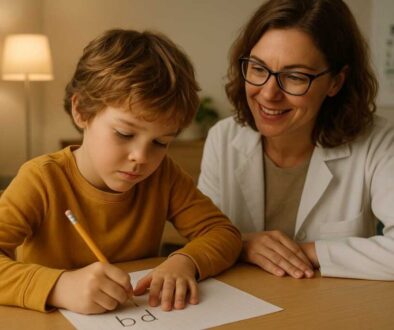How ADHD Affects Vision: Signs, Therapy & Solutions

How ADHD Impacts Vision: Understanding the Connection
Many people recognize ADHD as a condition affecting focus, impulse control, and energy levels. Few understand its impact on vision. Studies suggest a strong association between ADHD and various vision problems, affecting children and adults alike.
These challenges go beyond blurred vision. They influence reading, comprehension, and daily activities.
ADHD is a complex neurodevelopmental disorder that affects millions of people worldwide. While much research focuses on cognitive and behavioral symptoms, growing evidence suggests that ADHD is associated with functional vision problems that can make learning, working, and everyday life more challenging. When a child or adult struggles with attention-deficit hyperactivity disorder (ADHD), they may also experience difficulties with eye tracking, focusing, and visual processing, which can further impact their ability to function in school, work, and social settings.
Key Takeaways: How ADHD Impacts Vision and Why It Matters
-
ADHD often involves hidden vision challenges beyond just focus and hyperactivity—many individuals struggle with eye teaming, tracking, and visual processing without realizing it.
-
Convergence insufficiency is a leading visual issue linked to ADHD, causing double vision, eye strain, and trouble focusing on close-up tasks like reading.
-
Vision problems can mimic or worsen ADHD symptoms, such as skipping lines, poor reading comprehension, or losing focus, yet standard vision screenings often miss these functional issues.
-
Vision therapy offers a drug-free, science-backed approach to support ADHD care by improving eye coordination, focus flexibility, and visual processing speed.
-
Studies show up to 25% of children with ADHD also have undiagnosed binocular vision dysfunction—an issue correctable through specialized eye care and therapy.
-
Key signs that vision may be affecting your child’s ADHD include frequent headaches, blurred vision, clumsiness, and avoidance of close work.
-
Comprehensive vision exams by a developmental optometrist go far beyond 20/20 testing, pinpointing visual triggers behind attention issues and creating personalized therapy plans.
-
Early intervention through vision therapy can dramatically improve academic performance, attention, and quality of life for individuals with ADHD.
How ADHD Affects Vision
Convergence Insufficiency
One of the most common vision problems in people with ADHD is convergence insufficiency. This condition makes it hard for both eyes to work together when focusing on close objects. Symptoms include:
-
Double vision or blurred words while reading
-
Frequent loss of place while following text
-
Eye strain or headaches after near work
-
Difficulty focusing on close-up tasks
Refractive Errors and Accommodative Dysfunction
Individuals diagnosed with ADHD often struggle with:
-
Astigmatism, hyperopia (farsightedness), and hypermetropia
-
Difficulty adjusting focus between near and far objects
-
Increased variability in focusing ability
Color Perception and Contrast Sensitivity
Research shows a measurable link between ADHD and reduced ability to perceive color contrast, especially in the blue spectrum. This may affect visual processing and reaction speed.
ADHD and Binocular Vision Dysfunction
Eye Teaming and Tracking Issues
Children and adults with ADHD tend to have difficulty with eye movement control. This includes:
-
Strabismus (eye misalignment)
-
Poor depth perception
-
Struggles with rapid eye movements needed for reading and sports
These issues are often misdiagnosed as ADHD symptoms, when in fact, they are treatable vision disorders.
Symptoms of ADHD and Vision Problems Overlap
-
Frequent skipping of words or lines
-
Struggles with copying from a board or book
-
Reduced reading comprehension despite intelligence
The Role of Eye Care in ADHD Management
Can Vision Therapy Help ADHD Symptoms?
Some experts believe that vision therapy can support individuals with ADHD and vision problems by improving eye tracking, teaming, and focusing abilities. A structured program may involve:
-
Exercises to improve binocular vision dysfunction
-
Tools like prism lenses to align vision
-
Training sessions to enhance visual processing
While vision therapy does not cure ADHD, it can reduce visual distractions, making it easier to focus on tasks.


When to See an Eye Doctor
If a child with ADHD struggles with reading, headaches, or double vision, a vision therapy evaluation is essential. A qualified eye doctor can check for:
-
Functional vision issues affecting learning
-
Misalignment of the eyes (binocular vision dysfunction)
-
Refractive errors needing correction
Vision Screening vs. Vision Therapy Eye Exams
Many children pass a school vision screening yet still have undiagnosed visual problems. A vision therapy evaluation tests depth perception, eye teaming, and tracking abilities, among other things, revealing hidden challenges that standard school screenings, and even routine eye exams, miss.
Scientific Evidence Linking Vision Therapy and ADHD Symptom Improvement
Attention Deficit Hyperactivity Disorder (ADHD) is commonly associated with challenges in focus, impulse control, and hyperactivity. Recent studies now reveal a compelling link between ADHD symptoms and undiagnosed visual processing disorders. Vision therapy—a non-invasive, evidence-based program targeting eye coordination and visual efficiency—has emerged as a promising adjunctive treatment for reducing ADHD-related difficulties.
Research Highlights: Vision Therapy’s Role in ADHD Management
Leading institutions have published rigorous studies demonstrating how vision therapy enhances attention and academic outcomes for individuals with ADHD:
-
National Eye Institute (2021): Office-based vision therapy paired with home exercises improved convergence insufficiency (eye coordination disorder) in 73% of participants. This led to fewer headaches, better reading fluency, and reduced school-related stress—key factors for children with ADHD.
3 Ways Vision Therapy Targets ADHD-Related Challenges
Vision therapy tackles three core visual dysfunctions commonly seen in ADHD patients:
-
Eye Teaming/Tracking Issues: Struggles with coordinated eye movements, causing reading fatigue and difficulty focusing.
-
Accommodation Problems: Inability to maintain focus on near tasks (e.g., textbooks), leading to headaches and poor concentration.
-
Visual Processing Delays: Slowed brain interpretation of visual input, impacting organization and task completion.
Why Vision Therapy Matters in Modern ADHD Care
For families and professionals navigating ADHD, vision therapy provides a science-backed, drug-free option to enhance traditional treatments like medication or behavioral therapy. With 62% of patients reporting improved focus post-therapy (Journal of Behavioral Optometry, 2023), this approach supports the shift toward integrative, whole-person ADHD care.
Does Your Child with ADHD Need Vision Therapy? 8 Red Flags to Know
Up to 25% of children with ADHD also have undiagnosed binocular vision dysfunction—a treatable issue often missed in standard eye exams. Recognizing these subtle but impactful signs can help you decide if a pediatric vision therapy evaluation is needed:
-
Frequent Headaches/Eye Strain: Discomfort after reading or homework.
-
Poor Tracking Skills: Skipping lines or losing place while reading.
-
Blurred/Double Vision: Complaints of unclear text or overlapping images.
-
Avoidance of Close Work: Resistance to reading, writing, or drawing.
-
Clumsiness: Difficulty catching balls or frequent spills.
-
Weak Visual Memory: Trouble recalling recently read material.
-
Distractibility in Busy Spaces: Overwhelmed by cluttered visuals.
-
Eye Rubbing/Excessive Blinking: Signs of visual fatigue.
Why These Symptoms Demand Attention
According to a 2022 study in Optometry and Vision Science, 1 in 4 children with ADHD has convergence insufficiency—a binocular vision disorder directly linked to attention struggles. Traditional “20/20” screenings don’t assess functional vision skills like eye teaming or tracking, leaving these critical gaps undetected.
What a Specialist Looks For
A developmental optometrist certified by the College of Optometrists in Vision Development (COVD) will evaluate:
-
Eye Teaming: How well eyes work together
-
Focus Flexibility: Shifting focus between near/far
-
Visual Processing Speed: The Brain’s interpretation efficiency
-
Hand-Eye Coordination: Writing or sports performance
This 90-minute assessment pinpoints vision-related ADHD triggers and creates a tailored therapy plan.
Final Thoughts
Recognizing the link between ADHD and vision problems is crucial for early intervention and effective treatment. Many individuals with ADHD experience visual difficulties that impact reading, learning, and daily life. Addressing these challenges with vision therapy, corrective lenses, and specialized eye care can significantly enhance focus and overall well-being.
If you or your child struggles with focus, reading, or eye strain, seeking a comprehensive eye exam can uncover underlying vision issues that may be mistaken for ADHD symptoms. The right interventions can make a profound difference in academic performance, productivity, and quality of life.
At Cook Vision, we specialize in vision therapy tailored to individuals with ADHD and vision problems. Early intervention helps children see clearly, focus better, and learn more effectively.
For more information or to schedule an exam, visit Cook Vision today.
FAQs
-
What is vision therapy and how can it help with ADHD?
Vision therapy is a personalized program of eye exercises that improves eye coordination and visual processing, helping reduce ADHD symptoms like inattention and reading difficulties.
-
How do I know if my child with ADHD needs a vision therapy evaluation?
-
Can vision therapy improve attention and focus in children with ADHD?
-
What vision problems are most common in people with ADHD?
-
How long does a typical vision therapy program take for ADHD-related vision issues?
-
Is vision therapy a replacement for ADHD medication?
-
Where can I find a qualified vision therapist for ADHD?
-
How does convergence insufficiency affect children with ADHD?
-
What are the benefits of vision therapy for ADHD adults?
-
Can vision therapy help with reading difficulties in ADHD?
-
How do I prepare my child for a vision therapy evaluation?
-
Are vision therapy results permanent for ADHD-related issues?


